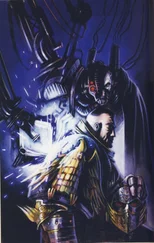She offered him the hard case. “I’ll tell you what. A trade. You tell me how you ended up on Janus’s radar and I’ll give you these.” Kelso cracked open the case to reveal a pair of replacement legs. “Caidin make. They’re compatible with the TYM chassis you got.”
He nodded and took them. “Fair deal.” Saxon had extensive field training in augmentation repair, and he set quickly to work on his limbs. As he spoke, he let it spill out of him; from the incident in the Grey Range to Namir’s recruitment pitch, the events in Moscow and Janus’s first challenge, to the moment in the grounds outside Temple’s house. “I suppose that’s when I knew it,” he concluded. “When I couldn’t stay silent anymore. I thought I was going to make a difference in the world. But all we did was exercise someone else’s power.”
He sealed up the last of the connections and pushed off the gurney. Saxon stumbled a little as the gyros in the replacement modules ran through start routines and synchronized.
Kelso nodded at the legs. “You can consider that repayment for not shooting me.”
He jerked his chin at the door flap and the warehouse beyond. “And the rest of this raggedy lot? What’s their take?”
“Half of them think you’re a security risk and want you killed. They found an inert tracer in your damaged leg. The other half want to interrogate you. Pull out everything you know about the Tyrants.”
Saxon snorted. “Hell, I’ll give you that for nothing. I’ll sing like a bloody canary, as long as you promise me I get to be there when the Tyrants are taken down.” He looked away. “I got no loyalty to them. Once, maybe… I thought I did. But right now, the only thing I want to do is break them.”
The woman gave a nod. “Well, we got that in common, then.”
The tent flap opened and a young guy peered in. His face was flushed with excitement. “Kelso! We got the uplink! Looks like our new pal here was on the money.”
Saxon stepped forward, limping slightly. “This I wanna see. Show me.”
Kelso followed D-Bar back to the hacker’s work pit. In the center of the warehouse was a section of the building that had probably been a cluster of bathrooms; now all that was left was a square patch of yellowed, cracked tiles and the brick roots of partition walls demolished in the name of some refurbishment project that had never come. There were ragged holes in the tiled floor, from which snaked thick knots of cabling; the Juggernaut hackers had helped the New Sons set up their base here by drilling directly into the municipal power lines running from the city, snatching watts from the raw feed.
A ring of consoles, server units, and eclectic computing hardware circled the cable trunk. Every one of the decks was alive with screens and holos showing complex, overlapping panes of data. D-Bar dropped into a canvas chair and set to work. Lebedev and Powell watched like a pair of sentinels, faces grim.
Anna saw the flash drive, the case broken open and festooned with jury-rigged connectors. Nearby, another of D-Bar’s team had Saxon’s vu-phone wired up to a console, which in turn was cabled to a collapsible satellite antenna.
“Here we go,” D-Bar said, cracking his knuckles. “Data sources are linked in parallel. All we need to do is ping the main Tyrant server and the rest is easy.”
Lebedev folded his arms. “How much risk is there to us? We’re opening a live connection to the Tyrants. What’s to stop them backtracking it to this location?”
“Agreed,” Powell added. “We could be calling an air strike down on ourselves.”
D-Bar made a face, as if those were the dumbest questions he’d ever been asked. “Okay, forgetting the fact that I’m bouncing our signal through a hundred other locational IPs around the country before we even send it, forgetting the copious layers of active subnet masks being run in real time by my troop of monkeys here”—he threw a wave at his team—“not to mention nigh-invulnerable firewalls written by yours truly, there’s this.” The hacker laid his hand on a black box lined with glowing indicators. “It’s a speed-imager. I need to get only a couple milliseconds of access to duplicate what we need from the Tyrant server. Then we can disconnect and run a virtual analog of it right here, without them ever knowing we were there.”
“So there’s no chance we’ll be detected?” Saxon asked.
D-Bar grinned. “I never said that. But if I screw up, the last thing we’ll see is the sky going white as some orbital laser array burns us off the face of the earth. So why worry, yeah?”
“Yeah,” Saxon replied flatly.
Lebedev sighed. “Do it.”
Anna stood back and watched. She really didn’t know what to expect; on the screens, timer windows opened as a web of virtual system nodes unfolded, depicting a representation of the connection, the servers, the target. D-Bar’s face became a study in calm as he plunged into the lines of code. His augmented hands were a blur across the keyboard in front of him, and flashes strobed down the connector cables that wound from a terminal behind his ear to the console.
Saxon looked up at the grimy skylights over their heads. “Nothing yet.”
Rods of data reached from node to node across the screen, the alarm timer falling with each passing moment. At zero, the network would go into lockdown and the tiny window of opportunity to invade the server would slam shut. It would be the virtual equivalent of sending up a flare in front of the Tyrants.
Nodes turned green where the hacker team had been successful, others blinked red where the invading code was not taking root. Anna realized that D-Bar and the others here in the warehouse were not the only members of Juggernaut working on this digital attack; other inputs from across the globe were leading their own assaults. But of Janus, there was no sign.
“Ten seconds,” Powell said, reading off the time. “Can you do this or not?”
“Do it?” D-Bar sniggered. “It’s already done!” With a flash, all the nodes went green, and the hacker lolled back in his chair, jerking the connectors from his skull socket. “Piece of cake.” The film of sweat over his pale face put the lie to his words.
With five seconds left on the clock, the connection was severed; but now a new construct was blossoming on the holographic screens. A meshing of three complex clusters of information—the flash drive, the vu-phone’s memory core, and the duplicate server.
D-Bar saw her staring into the display. “We still gotta work fast,” he said. “The ghost copy of the Tyrant server won’t maintain parity for long. It’s like trying to catch an echo. Longer you hold on to it, faster it degrades.”
“Open it up,” said Saxon. “Let’s see what I almost died for.”
A fourth data node emerged from the shared flux and blossomed like a flower made of newsprint, petal-pages spilling out. “The Killing Floor,” said Lebedev. “This is the means through which the Illuminati commune with the Tyrants, the method they use to give them their targets and their missions.”
Anna glimpsed vast libraries of files as they swept past. On some of them were names she had seen from her own investigations, but many were unknown to her. “We have to get a drop on them,” she said, thinking aloud. “We need to know the name of their next target before they attack it.”
“Exactly,” agreed Lebedev. “Find us a face and a name,” he told D-Bar.
“Look for something connected to an operative named Yelena Federova, code name ‘Red.’” Saxon pointed at the display. “She was deployed separately from the rest of the Tyrants. That has to mean something.”
Anna tensed with a moment of memory. “I think… she was the one who tried to murder me.”
Читать дальше











